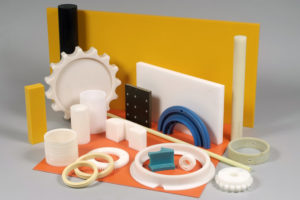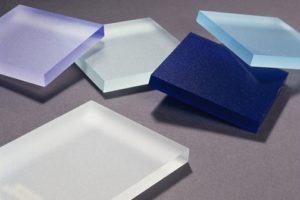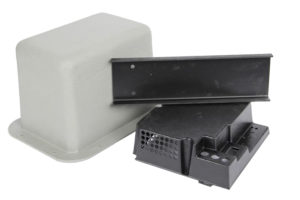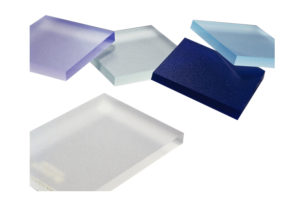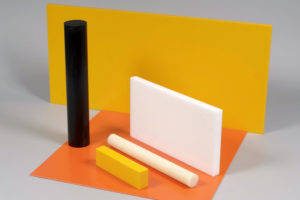Acrylonitrile-Butadiene-Styrene (ABS)
ABS plastic is a tough, rigid thermoplastic that is produced both as an extruded and annealed product. Annealed ABS has excellent impact, abrasion, moisture, electrical and creep resistance properties with very good chemical and stress-cracking resistance. It is resistant to inorganic salt solutions, alkalis and many acids. Extruded ABS is excellent for vacuum and thermoforming applications.
Acrylic
Acrylic offers crystal-clear transparency combined with outstanding chemical resistance, outdoor weatherability, and dimensional stability. It is also strong, resistant to breaking, easy to machine, has a low water absorption rate and resists staining by human handling. Acrylic is offered in cast and extruded forms.
Cast – Superior optical and surface qualities, maintains clarity when line bent or oven formed, paper masked both sides for protection.
Extruded – Low cost alternative to cell-cast. Some surface die lines and optical distortions are possible. Polyfilm masked on both sides.
High Density Polyethylene (HDPE)
HDPE (high density polyethylene) has a higher density and more rigidity than the LDPE and maintains good impact and abrasion resistance with continuous heat to 180 ºF. Choose the stress relieved stock if you plan to heat-form or machine the sheet.
A food grade HDPE is used for cutting blocks in meat or other food processing operations. Matte finished boards are odorless, tasteless and non-absorbent. Approved for N.S.F., U.S.D.A., and F.D.A. Federal specifications.
High Impact Polystyrene (HIPS)
HIPS is produced from the toughest resins to provide a superior product mix of processability, stiffness, formability, and impact strength. It is formulated to provide excellent toughness while being a very low cost thermoplastic. It will meet a wide variety of applications as it is extremely versatile and easily fabricated by drilling, routing, sawing, die cutting, or thermoforming.
Low Density Polyethylene (LDPE)
LDPE is a versatile low cost plastic characterized by its toughness, flexibility and resistance to chemicals.
Polycarbonate
Polycarbonate is the toughest transparent plastic produced. Outstanding impact strength (it is virtually unbreakable) makes it the material of choice for many industrial applications. It has good electrical insulation properties and low moisture absorption. Polycarbonate is resistant to both heat and flame, and is dimensionally stable and generally unaffected by greases, oils, and acids. Weatherability is good, but slightly below that of acrylic. Ultraviolet rays cause slight discoloring and embrittlement. Polycarbonate tubing offers the advantages of a clear, see-through tubing with the added impact toughness necessary for industrial applications.
Urethane
Polypropylene is the lightest of all commercial plastics with a good balance of properties. It operates safely at temperatures up to 140 degrees Fahrenheit with excellent resistance to many chemicals. It has high surface hardness and superior abrasion resistance, and is a great combination of properties including high corrosion resistance, weldability, and low cost.
Polyurethane
Polyurethane is unbeatable for the toughest impact and abrasion applications. It stands up to severe pounding, heavy abrasion, and gouging. Polyurethane never breaks in Izod impact testing. It also bears up under high loads and is shock resistant without deforming. It has superior resistance to oils, gasoline, and solvents. It is highly resistant to sunlight and weathering, and can handle temperatures up to 225 degrees Fahrenheit.
PVC
PVC Type I is a rigid thermoplastic that provides good value with low cost. It has exceptional chemical resistance, dimensional stability, low water absorption and superior resistance to weathering and sunlight. It is temperature resistant upto 150F.

